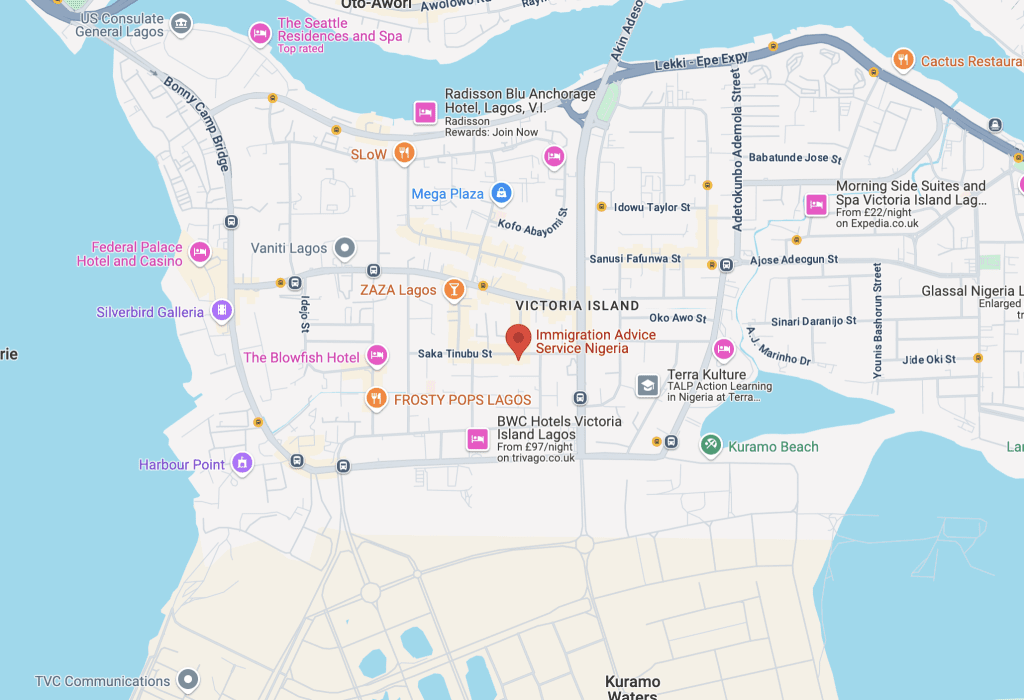IR1 visa for Nigerians
If a Nigerian resident marries a US resident and the couple decide they’d like to reside permanently in the United States, they may apply for a spouse IR1 visa. When granted, this marriage green card allows foreign nationals to live and work in the country as a permanent resident.
For more information and guidance on the process of applying for an IR1 visa, or for specific queries on the IR1 vs CR1 visa criteria, get in touch with IAS. The IAS Lagos office has vast experience and numerous qualified lawyers on-hand to assist with IR1 visa applications for Nigerian nationals. You can contact either our Nigerian office on +2342013438882 or on +44 (0) 331630092 or message us online.
Read our 1001 reviews
Request a call back from our immigration experts
Immigration Advice Service Nigeria
Benefits of Choosing IAS‘ USA Immigration Lawyers
When it comes to obtaining a USA visa or permit, IAS USA immigration lawyers are well-equipped to help you.
With IAS’s track record of successfully helping clients visit or immigrate to the United States, we can help businesses and individuals achieve their goals.
Our dedicated immigration lawyers provide our services through a comprehensive and personalised approach. With IAS, you enjoy:



Compassionate support from an experienced immigration lawyer dedicated to your success



Support in gathering supporting documents and completing a high-quality application.



Confidence that your case is being handled by an experienced team.



In-house document checks done by lawyers who are well-versed in US immigration matters.
Services we Provide
Are you Looking for More Information About the IR1 Visa?
We have successfully assisted numerous Nigerians with their US Spouse Visas. If you need help and don’t know where to start, do not hesitate to contact us for immediate support. Let us handle all the complexities and make your application process as stress-free as possible.
Nigerian Emigration
For Nigerian emigration matters, please call +44 (0) 3316300929 or +2342013438882
Other Immigration and Emigration Matters
For immigration/emigration to/from other countries, please call:
US – +1 844 290 6312
Ireland – (+353) 061 518 025
UK – (+44) 333 4149244
What is an IR1 visa?
An IR1 visa is a spouse visa that allows non-US citizens to live in the country permanently to live with their husband, wife or legal partner. This includes couples where a Nigerian citizen has married a US citizen.
The IR1 visa gives the couple the ability to build their life together in the same geographical territory – living, working and/or studying. If granted and the married couple have a child, this child will be granted US citizenship automatically.
The ‘IR1 visa’ name is an acronym for ‘Immediate Relative spouse visa’. When granted, the spouse under this visa will be able to apply for a permanent residency permission in the US immediately. This spousal visa is often known colloquially as a ‘green card’, or more specifically a ‘marriage green card’, as to be a lawful permanent resident allows the couple to live together indefinitely.
An IR1 visa may be filed for directly if both parties meet the eligibility criteria, or upgraded to from another class of spouse visa.
Who is eligible for an IR1 visa for the United States?
This marriage green card is suitable for those who have been married for a minimum of 2 years, but there are several requirements in place.
The couple must be legally married under US law. Those considered ‘common law partners’ living together in overseas countries will not usually qualify for an IR1 visa, even if they have been cohabiting for over 2 years – but this is dependent on the laws of the country granting the marriage declaration.
Where the couple is polygamous, only the first legally wed spouse may qualify for an immigrant visa.
One of the spouses must already be a US citizen and able to declare a valid address in the country at which they intend to live for the foreseeable future. The spouse who is an existing US citizen must be able to financially support their partner until both of them have financial means to do so from within the United States.
As of June 2023, the ability to financially support a spouse is proven through the demonstration of financial means at 125% of the set federal poverty level. If the spouse who is already a US citizen is unable to meet such income requirements, they may be able to apply to use a joint sponsor to do so. The federal poverty level is changed periodically in line with the economic climate and so the exact value of money required should be checked when going through the IR1 visa application process.
While there is technically no minimum age for the spouse who is a US citizen to file the initial petition for the IR1 visa on behalf of their partner, they will need to be at least 18 years old when the final paperwork is to be signed.
The application process for an IR1 visa
Unlike some marriage green card visas granted by the United States, the IR1 visa is not capped in number annually and so applicants are free to file their application at any time during the year once the USCIS (US Citizenship and Immigration Services) has approved their spouse’s petition.
The application should be submitted at a US Embassy or Consulate.
Step One: Petition
The spouse that is a US citizen must file a ‘Petition for Alien Relative’ with the USCIS to acknowledge the intention for an immigrant visa application. This is done online through the completion of the I-130 form and is submitted directly to the USCIS.
The petitioner will be required to submit several documents (or copies of) to prove their eligibility as a US citizen. This includes, but is not limited to:
- Birth certificate
- Marriage certificate
- Prior-marriage termination papers (if applicable)
- Financial documents
- Proof of their citizenship or permanent residency
- Military records
- Details of any previous US visas
- Details of any relevant police clearances/court records
The USCIS must approve this petition before the next step in the IR1 visa application process can be taken. There is, unfortunately, no set time for the I-130 petition to be approved but it can take anywhere from two months to over a year – dependent on the USCIS’s pipeline and the amount and accuracy of information available filed.
It’s worth noting that the translation of ‘petition for alien relative’ doesn’t mean the same thing in many languages – and in this case, ‘alien’ can be translated as ‘immigrant’.
When approved, the prospective applicant will receive an NVC (the National Visa Center) pack detailing next steps.
Step Two: Immigrant Visa Electronic DS-260 form
The first part of the specific IR1 visa application process is the same as any other for an immigrant to the US: to complete the Immigrant Visa Electronic Application DS-260 form. This online form is accessed using the National Visa Center case number from the US citizen spousal visa petition, which links it electronically to the application.
The DS-260 form can be completed by either the visa applicant or someone helping them with the necessary knowledge and experience, such as a qualified lawyer with IAS. The form includes questions on the applicant’s personal information, background and the purpose of their desired immigration to the United States.
Once submitted, the applicant is provided with an electronic confirmation page and reference number. This should be saved and attached to all supporting documents to be submitted.
Step Three: Medical examination and vaccinations
There are several medical and vaccination stipulations that the US makes for individuals to gain citizenship.
Exactly which medical check-ups and vaccines are required depends on the nationality of the applicant and this will be detailed in the NVC pack received by the applicant. All medical procedures and vaccinations must be undertaken by a licensed doctor who will sign the relevant documents.
Once complete and signed, all relevant medical documents must be attached to the supporting file.
Step Four: Complete file of relevant documents
Aside from the required medical information, there are various supporting documents that can be included alongside the IR1 visa application. Each demonstrates to the National Visa Center the trustworthiness, reliability and authenticity of the application and aims to prove that the applicant would be a good citizen.
Exactly what supporting documents are required or are appropriate for inclusion should be judged on a case-by-case basis. A specialist immigration lawyer such as those working in the IAS offices will be able to offer advice on what can or should be attached to an IR1 visa application in order to enhance its chances of approval.
Step Five: Attend immigration interview
Once all relevant documents have been submitted, the applicant will be invited to an in-person interview at the US Embassy or Consulate handling their application. While this may seem a daunting prospect, everyone looking to apply for a US visa will need to attend an interview.
There are two potential sites for IR1 visa interviews in Nigeria: a US embassy in Abuja on Diplomatic Drive and a US consulate on Victoria Island in Lagos.
If, at this point, the NVC believes not all appropriate documents have been received, they will contact the applicant to request more information.
Contrary to popular belief, there are no set IR1 visa interview questions, but the applicant can still prepare themselves for this step. It is likely that the interviewer will want to learn information on the marriage, the applicant’s personal and professional background, and their current circumstances.
Final Step: Receive approval and travel to the US
If satisfied that the applicant’s relationship is genuine and that their reasoning for immigrating to the US is sound, it is typical to hear of the IR1 visa approval within a couple of weeks after the interview. The applicant will receive in the post a visa placed within their passport and a sealed envelope with NVC documents inside.
It is critical that this envelope is not opened. It is only to be unsealed by an immigration officer at the US border when the applicant arrives in the country. Failure to allow an immigration officer to open these documents can result in entry refusal and vastly complicate the process.


IR1 visa fees
Fees are payable to the US authorities at several times during the IR1 visa application process. The NVC will not process an immigrant visa application until the relevant fees have been paid.
The exact monetary figure of fees owed for an IR1 visa application to be processed varies dependent on the checks to be carried out and the parties involved. Sums are charged by the USCIS for the initial petition filing and the NVC for the application processing: at a fixed cost of $675 ($625 if filed online) for the processing of Form I-130 (the initial Petition for Alien Relative) and $325 for the processing of Form DS-260 (the main application form). It is crucial that the advice of a specialist service such as IAS is sought in order to avoid any hidden or unexpected costs.
Additional indirect costs incurred may include fees for obtaining copies of relevant documents, photocopying charges, postal expenses and travel costs.
Fees must be paid for each applicant, no matter their age. All fees are non-refundable – even if the IR1 visa application is not granted.


Processing time for IR1 visa applicants from Nigeria to the United States
There is no set time frame for the NVC to process an IR1 visa application, but there are several steps that applicants can take to ensure things progress as quickly as possible.
While generally speaking, the application processing is lengthy and can take up to a year, there are several reasons why delays may occur. These include:
- A continued backlog of applications being worked through as a result of federal disruptions such as strikes, shutdowns and pandemic working practices
- A high level of applications being received by the NVC at any one time
- The wrong documents or inaccurate documents being included
- Clerical errors
It is recommended that applicants seek advice and guidance from a specialist immigration firm such as IAS. This ensures that all relevant and helpful documents are included, that all forms are completed accurately for easy processing and that any complications can be avoided. You can contact either the IAS Nigerian office on +2342013438882 or +44 (0) 3316300929.
Once the immigration interview has taken place, most applicants will receive word of their IR1 visa approval or denial within 7-10 working days. This may occur before the visa is physically received, which can take up to another 2 working days.
If the application is subject to ‘additional processing’ post-interview, at least a further 60 days should be allowed for this to take place. This is most commonly due to required information either not being available at time or interview or being clear.
If the application is subject to a ‘waiver of ineligibility’, up to 8 months should be allowed for further processing – and even longer in the case of an application having been completed incorrectly.
IR1 visa ineligibilities and misrepresentations
It is legally binding that every detail on a visa application (both for IR1 visas and all other visas) is provided truthfully and accurately to the best of the applicant’s knowledge. Any detail provided that is false or misleading will jeopardise the eligibility for the visa.
There are some ineligibilities for which the applicant can file for a waiver to counteract. During or prior to the application process, it is advised that a qualified lawyer specialising in visas is consulted to ensure that this is properly filed for and that the application is not just outright rejected as a result.
Common ineligibilities for an IR1 visa include prior criminal convictions, the submission of fraudulent documents (knowingly or unknowingly) and the recorded overstay of any previous visa.
Where it has been deemed that an IR1 visa is being applied for with wilful misrepresentation of material fact or fraud, the application will be denied. Judged on a case-by-case basis, it may be that the applicant not only loses the right to obtain any US visa or to enter the country at all.
IR1 vs CR1 visa: What is the difference?
The IR1 visa is often referred to alongside the US CR1 visa, as they are similar spousal visa classes. However, there are a few differences in their eligibility criteria and their restrictions once the couple are admitted into the United States.
A CR1 visa (Conditional Resident visa) can be applied for by spouses who are citizens of countries other than the US who have been married for less than the 2 years to a US citizen required for an IR1 visa. At the point after arrival in the US where they have been resident in the country for a further 2 years, the conditional resident may then apply to remove the conditions from their visa and upgrade to a 10-year permanent resident card.
This provides the equivalent rights at the IR1 visa.
Materially, the difference is that a CR1 visa will need upgrading after 2 years, whereas an IR1 visa won’t: but what can be applied for is dependent on how long the couple have been married for. This means that the IR1 vs CR1 visa decision for applicants is usually determined by the time they have been wed.
How Can IAS Help?
IAS’ specialist visa team have vast experience with the application and appeal processes for Nigerians looking to be granted residency in the United States alongside their spouse.
The IAS team are able to advise on document filing and presentation, immigration interview preparation and how to optimize your application for its best possible chance of success. Should you have specialist queries relating to IR1 visa applications, petitions or appeals specific to Nigerian spouses, we are well placed to help. We can guide you through every step of the process right through to your move to be together in the US.
With offices in both Lagos and the US, IAS staff are always on-hand to guide and advise, wherever you are in the world and whenever you find easiest to work with us. You can message us online or contact our Nigerian office on +2342013438882 or call our London office on +44 (0) 3316300929.
Table of Contents
Table of Contents will appear here.Legal Disclaimer
The information provided is for general informational purposes only and does not constitute legal advice. While we make every effort to ensure accuracy, the law may change, and the information may not reflect the most current legal developments. No warranty is given regarding the accuracy or completeness of the information, and we do not accept liability in such cases. We recommend consulting with a qualified lawyer at Immigration Advice Service before making any decisions based on the content provided.
Frequently Asked Questions
There is little time difference in the application and approval processes for an IR1 visa and a CR1 visa. However, if an applicant is eligible for an IR1 visa it is usually recommended they apply for this instead of the CR1 visa as it won’t require further intervention for a 10-year period.
Applicants can choose to receive a Social Security card during the completion of the application form online. When granted, the applicant can expect to receive the card in the post to the United States address given within 6 weeks of arrival. If, for whatever reason, this doesn’t arrive or isn’t elected, the individual can apply directly for a number and card with the Social Security Administration once in the country.
The residency permit granted to successful IR1 visa applicants must be renewed after 10 years. More information on this process can be obtained at a US embassy or consulate.
The approval rates for all US visas are published online periodically by the relevant authority and are updated all the time. A qualified visa lawyer will be able to advise on the current statistic.
Visa bulletins are monthly updates on the status and expected approval times for various US immigration visas. However, as there is no specific limit on the amount of IR1 visas that may be filed for at any one time, there is no IR1 visa bulletin for applicants to be aware of.


What our clients are saying
How our UK Immigration Lawyers can help
At the Immigration Advice Service our lawyers specialise in a wide range of UK visas, nationality and asylum applications and have represented clients in various successful complex and high-profile cases.





















